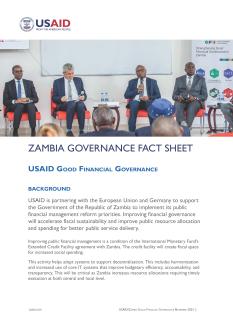USAID is partnering with the European Union and Germany to support the Government of the Republic of Zambia to implement its public financial management reform priorities. Improving financial governance will accelerate fiscal sustainability and improve public resource allocation and spending for better public service delivery.
Improving public financial management is a condition of the International Monetary Fund’s Extended Credit Facility agreement with Zambia. The credit facility will create fiscal space for increased social spending.
This activity helps adapt systems to support decentralization. This includes harmonization and increased use of core IT systems that improve budgetary efficiency, accountability, and transparency. This will be critical as Zambia increases resource allocations requiring timely execution at both central and local level.
GOALS
Goal One
Improve budget credibility.
Goal Two
Strengthen domestic resource mobilization (including tax policy and tax administration).
Goal Three
Increase the Government of the Republic of Zambia’s capacity to steer and implement comprehensive cross-cutting public financial management reforms and processes.
ANTICIPATED RESULTS
- To improve fiscal sustainability.
- To increase operational and allocative efficiency of public spending, with increased climate and gender sensitivity.
- To strengthen the intergovernmental fiscal architecture.
- To strengthen the Ministry of Finance and National Planning capacities to design a more effective, efficient, gender sensitive and equitable tax system.
- To strengthen the Zambia Revenue Authority’s tax compliance management.
- Bolster the Ministry of Finance and National Planning and other core actors’ capacity for change management.

